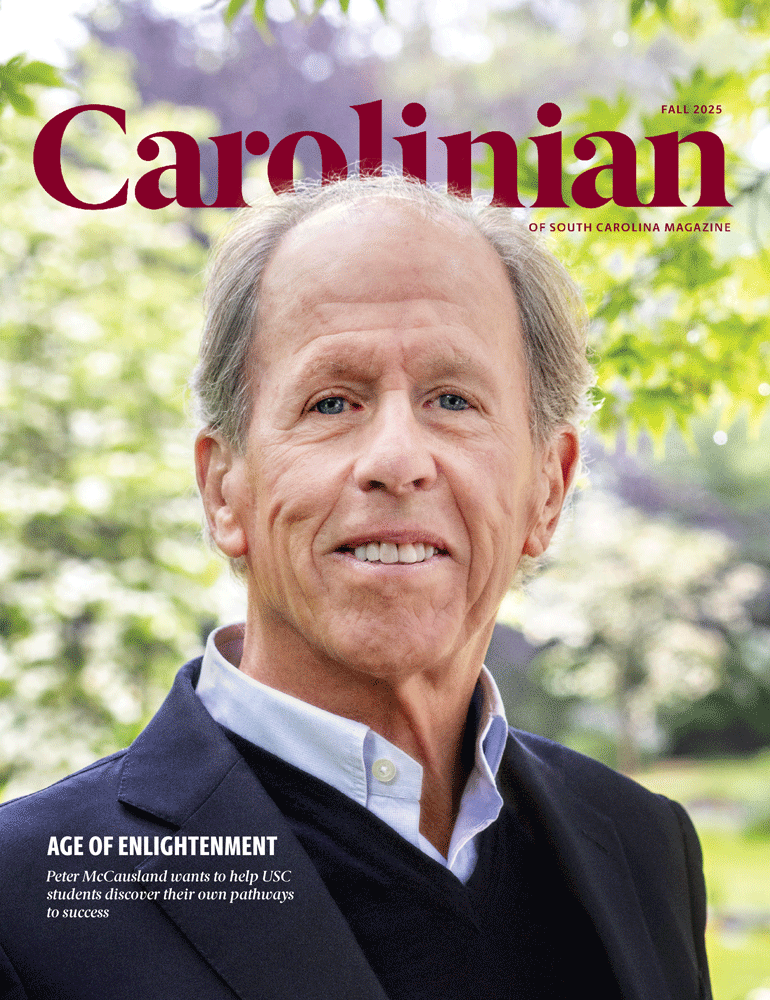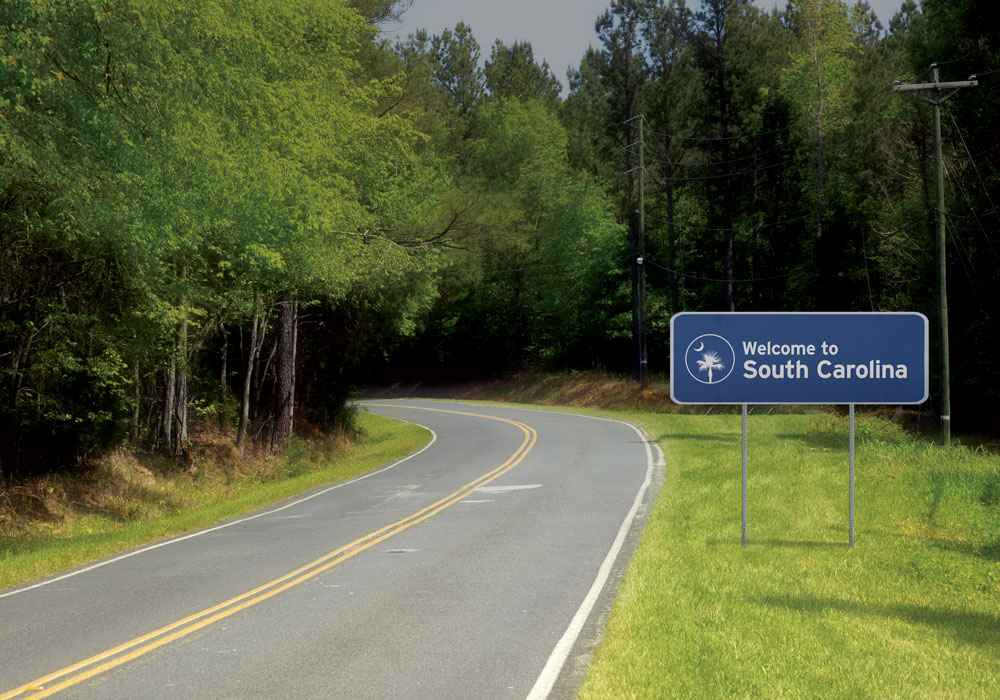
From obstetricians and nurses to social workers and psychiatrists, University of South Carolina graduates are especially needed in rural areas, where more than a quarter of the state’s residents live. And the impact isn’t only felt by the patient; it’s also felt by the communities themselves.
Carolinian visited several alumni whose small-town efforts are having a big impact. These proud health care workers showed us the meaning of dedication and their commitment to the people and communities they serve.
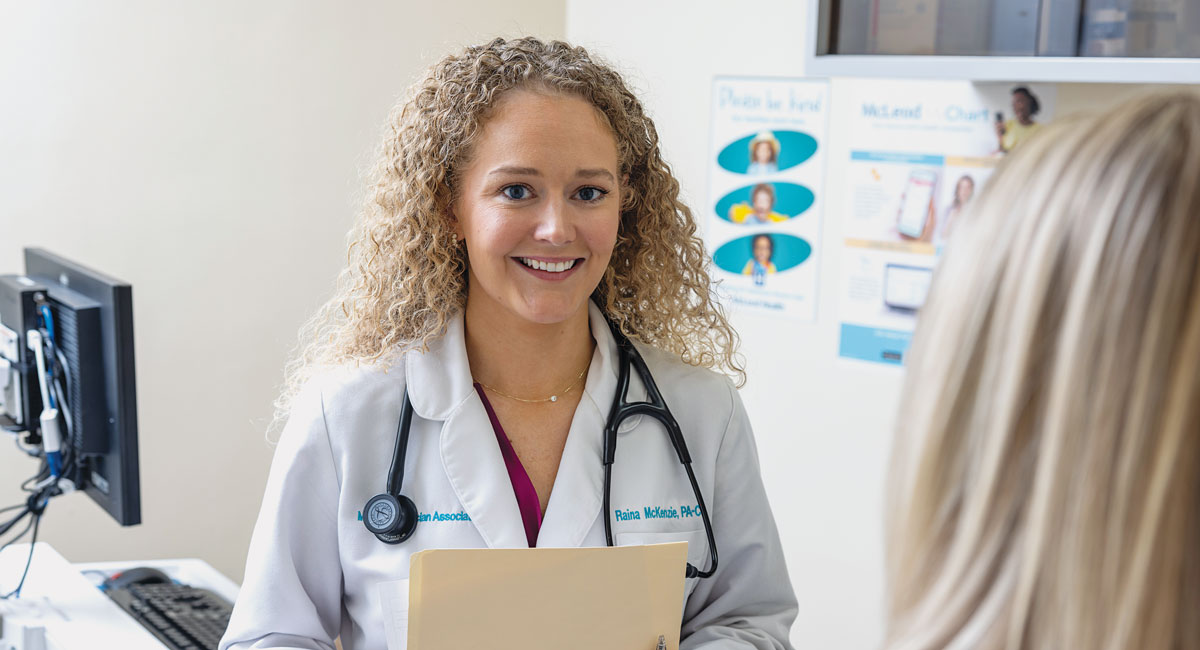
For Raina McKenzie Philhower, staying close to her hometown was never a question. Her sisters Raegan and Kendall went to college in New York City and Hawaii, respectively, but Raina felt the tug of the 3,000-person city where she was raised.
“It just always felt like after I got my degree and graduated, whatever that was going to be, to come back to Kingstree,” says Philhower, whose father still works as a row crop farmer. “Maybe it’s part of being an oldest child, but being medically minded it was like, ‘Who’s going to take care of mom and dad? Who’s going to take care of my grandma?’”
So she stayed close, earning her bachelor’s in biological sciences from the University of South Carolina in 2018 and graduating from the School of Medicine Columbia’s physician assistant program in 2021. As fate would have it, one of Kingstree’s only physicians retired the summer after Philhower graduated, and she was hired to replace him at the local McLeod Family Medicine office, a cozy brick home converted into a clinic with three exam rooms.
Family medicine sees patients ages 2 and up, from infancy to old age, providing care across the entire lifespan. And while some in the health care field see family medicine as one of the easier specializations, Philhower has found the challenges of practicing rural family medicine to be uniquely rewarding.
“Being in Kingstree, with such limited resources, we really are everything,” she says. “We’re urgent care. We’re women’s health. We’re pediatrics and ortho. There’s a big need for mental health services, so a lot of times we’re wearing that hat as well.”
There’s also a big need for health care providers who can help patients manage heart disease, diabetes and other chronic health conditions that are more prevalent in rural communities. For Philhower, it can be a challenge getting through to patients who are struggling to control their high A1C levels or don’t understand what chronic kidney disease means for their lifestyle. But, when she succeeds, it’s the most rewarding part of her job.
“You see that light click, you see them understand the concept,” she says. “And then at their next visit, their labs are improving, their sugars are improving, and they’re getting excited about their health. That’s what really makes it worth it.”
Rural family medicine isn’t for everyone. The line between work life and personal
life can be blurry when you see your patients at the grocery store or in the church
pews on Sunday morning. But for those who do end up in a small town — because it’s their hometown or because it’s a place they’ve
fallen in love with —
the difference they make is meaningful.
“It’s the strong commitment and ties that you feel — and the pressure, in a sense, because this is your community and you want it to thrive,” she says. “You’re giving it 110 percent every single day to help those people, because who else is going to? It is that sense of need that really continues to call me here.”
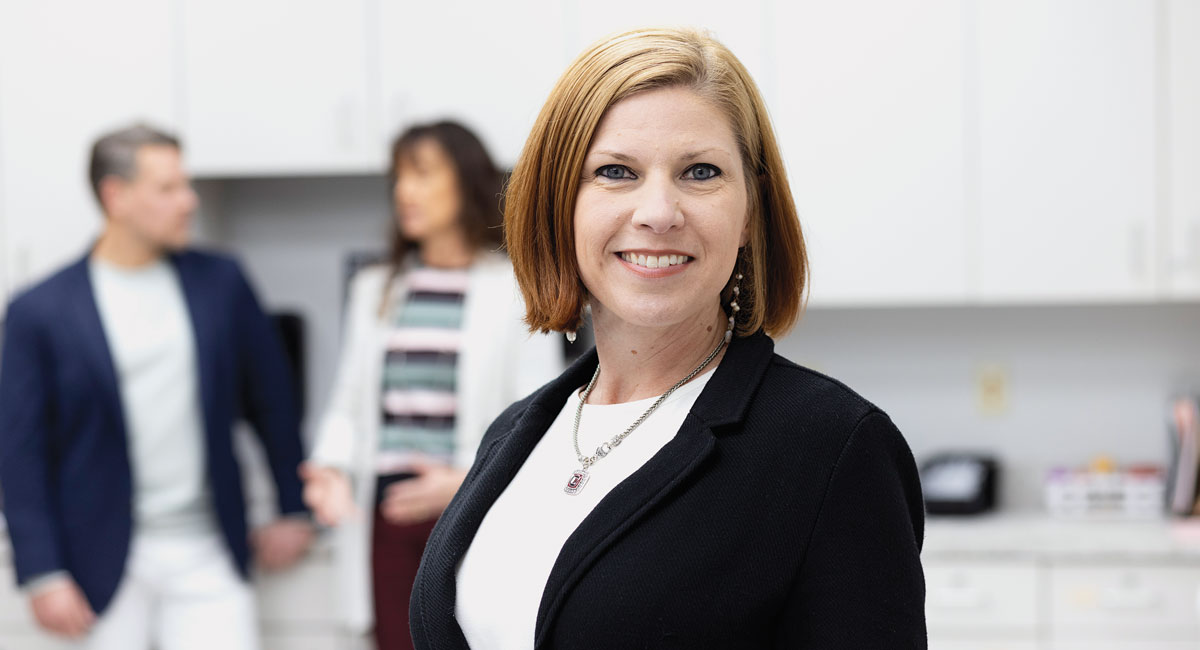
As a social worker, Dee Robinson believes each member of her community deserves to have their needs met. It’s one of the reasons she has worked in behavioral health since earning her Master of Social Work from the University of South Carolina in 2014. And it’s why, several years ago, she helped launch a consortium to build synergy with others working in the same field.
Robinson is deputy director of the Tri-County Commission on Alcohol and Drug Abuse, or TCCADA, a South Carolina agency that provides behavioral health prevention, intervention and treatment programs to people in Orangeburg, Bamberg and Calhoun counties. Her team has always collaborated with other local and state organizations engaged in similar work.
“But then everyone would go back to their silos, and you really wouldn’t see a lot of change happen,” Robinson says. “So, we had this idea — instead of everyone always rallying the troops for their independent needs, what if we brought together a consortium so that everyone could get their needs met from the same group?”
That gave rise to Bringing Our Best Care (Bamberg, Orangeburg, Barnwell, Calhoun, or BOBC2) which wasted no time turning ideas into action. After researching models that were working in other communities, the team created a mobile behavioral health clinic and held pop-up clinics at local HBCUs, libraries and elsewhere. Robinson hopes to work on an anti-stigma campaign as a future project.
For Dr. Peter Loper Jr., '11 medicine and medical director of TCCADA’s William J. McCord Adolescent Treatment Facility, the consortium’s achievements are a testament to how Robinson — and, more broadly, TCCADA — approach problem-solving.
“It’s not, ‘How can we do it?’ It’s, ‘How do we think outside of the box and create something that doesn’t exist?” he says. “This growth mindset has been really refreshing to me. It’s innovative, and I think it’s by virtue of the culture that’s been established here.”
Originally from Charlotte, Loper says working with adolescents in the 15-bed inpatient facility is more than providing clinical care. It can also mean providing a listening ear on the basketball court after a long day. Treating the whole person and not just the symptoms is an approach shared by the entire team, from the counselors to the nurses to the administration.
“I think what I found here is a manifestation of what I learned to value in medical school — the value of a multidisciplinary, holistic approach where we are managing primary medical problems in addition to comorbid mental health problems in addition to the primary substance use,” Loper says. “There’s value in that multidisciplinary team effort embedded in the context of a community. We have a family feel here, and I think that translates to our patient care.”
Robinson brings it all back to the idea of macro-level medicine, which focuses on an individual patient with the goal of improving their outcomes. Think: diagnoses, counseling and medication-assisted treatment — the things that happen each day at the TCCADA. Medication-assisted treatment at TCCADA is provided by family nurse practitioner Wanda Copeland, '90 master's in nursing.
Beyond that, the team provides macro-level care through larger-scale efforts focused on overall community health: BOBC2’s pop-up clinics, for example, and the agency’s work to bring a psychiatric residency program to Orangeburg. Then there are satellite facilities it operates in Bamberg and Santee to improve access for rural residents in its three-county catchment. Recently, TCCADA formed an opioid response team that sends a peer support specialist with first responders to help treat overdoses and offer a bridge into treatment programs.
In social work school, Robinson thought she would become a therapist and focus solely on micro-level patient care. Moving into the deputy director role opened her eyes to the need for advocacy within her community.
“There’s still so much work that we have to do with mental health and addiction to have it be treated as full behavioral health. There’s still so much stigma with substance use,” she says. “We try to advocate for that all the time. I really didn’t see it back then going through school. Now, I see the whole social work aspect of it every day.”
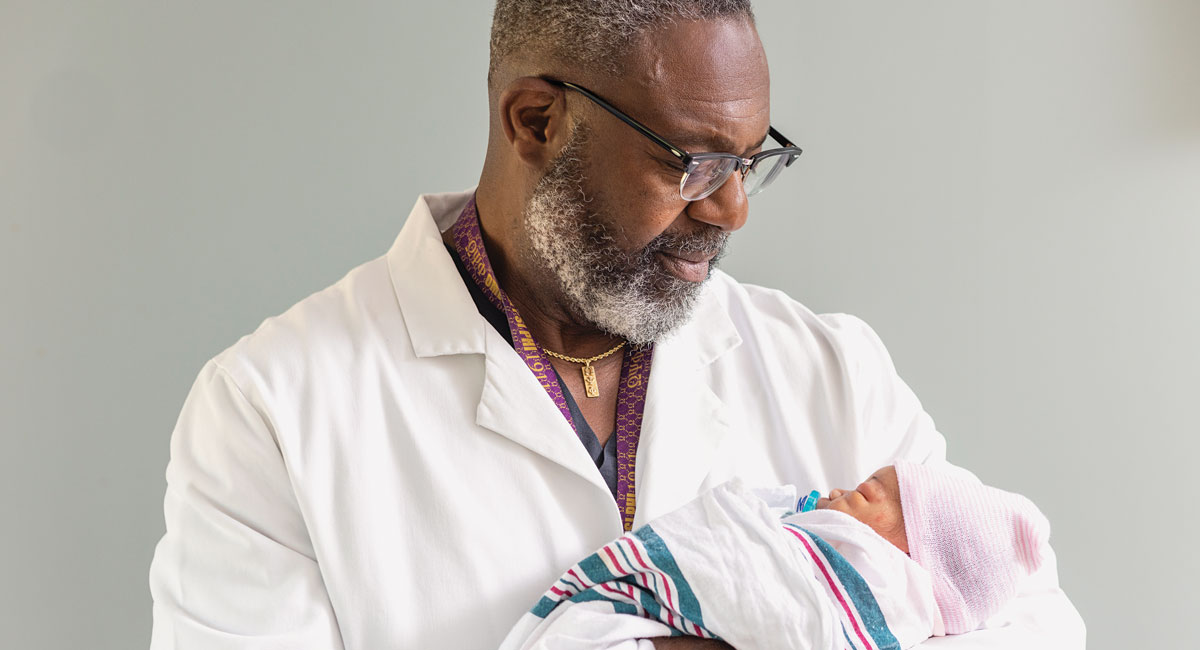
When basic necessities and disinfectants were in short supply during COVID, the people of Hartsville took care of Dr. Leroy Robinson. “I would come home from work, and there would be toilet tissue on my porch, there would be hand sanitizer, there would be Lysol,” says Robinson, a 1990 School of Medicine Columbia graduate. “They made sure I had it. They wanted me to stay healthy.”
That’s because Robinson, an OB/GYN with Carolina Pines, is one of the most beloved physicians around. Since coming to Hartsville 31 years ago, he has delivered more than 5,000 babies. In a community with a population of approximately 7,400 within the city limits, it’s safe to say he has touched the lives of virtually every resident.
“Hartsville is unique for small-town South Carolina because of the diversity in everything — in beliefs, in educational backgrounds, in race,” Robinson says. “We’ve got people who work at Talley Metals or Sonoco who come from all over the world, so you can get exposure to a lot of different cultures. And it’s progressive enough that you can meet them, get to know them and even go to their house for dinner.”
Between his work as a physician and his involvement with various boards and community organizations, he has gotten to know his neighbors. Patients stop him in public to show him photos of children he has delivered, but knowing your patients, he says, is just good medicine. He points to a concept called the biopsychosocial framework, which links physical and mental health to social environment.
“When you’re in a small town, that applies even more so because you have to take into account their state of mind as well as their social situations,” he says. “A doctor will see one of my patients and then tell me what’s going on, and I’m like, ‘You’ve also got to take into account what’s happening with her family. She just lost her mother.’ They’ll say, ‘How do you know that?’” He laughs. “I’ve been here for 30 years — I know everybody!”
When he’s not connecting with patients, he is connecting with patrons at Doc’s Humidor, a cigar, wine and jazz lounge he opened with a friend a few years ago. Housed in a converted train station, the lounge attracts customers from all walks of life.
“My business partner and I are both Black, and you may come in there on a Wednesday night and everybody sitting in there is white,” he says. “Some people, even in 2025, think that’s kind of weird, but I think it’s a good environment. I can relax and enjoy something that doesn’t matter in this time where everything seems to matter and enjoy the company of people for who they are and not what they believe.”
Recently, a woman came in while the doctor was bartending and thanked him for saving her daughter’s life. He had noticed an unusual skin lesion during a routine exam and biopsied it as a precaution. When the pathology report came back, it was melanoma.
“No matter what, I think I’ve made a difference, even if it’s just here in small town Hartsville, South Carolina,” he says. “I’ve delivered babies who are all over the world now, whether it’s with the military or whether it’s work or whatever. I’ve made a difference, and that difference is going to make a difference elsewhere.”
